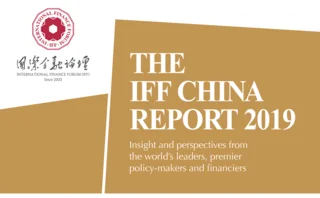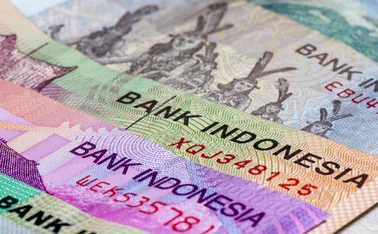
A journey with no end


As globalisation approaches a critical juncture of change, and world economic growth faces severe challenges, it is clear the need for China’s continuing reform and policy of ‘opening-up’ has never been greater. At the International Finance Forum’s (IFF’s) 15th Annual Conference in November 2018, participants discussed reform and opening-up on the 40th anniversary of the summit that launched China in a new direction.
Integration into the world
Zhou Hanmin, vice-chairman of the Municipal Chinese People’s Political Consultative Conference (CPPCC) Committee of Shanghai, said China has been integrated into the world and has been the world’s largest trading country for four consecutive years, contributing around 30% of growth to the global economy. For China, reform and opening-up is a journey with no end, and further integration is always the goal. Since the Third Plenary Session of the 11th Central Committee of the Communist Party of China (CCCPC) in 1978, China has embarked on a great journey of reform, opening-up and socialist modernisation, and has made the leap from a low-income to an upper-middle-income country. The 40th anniversary was an opportunity to review the process, assemble the valuable experience gained and make insights into its significance to China’s future development.

Zhu Guangyao, former vice-minister of the Chinese Ministry of Finance, said that, in the past 40 years, China’s economy has grown from RMB367.9 billion in 1978 to RMB82.7 trillion in 2017 – an approximately 15-fold increase. Today, China’s foreign exchange reserves exceed $3 trillion, from US$167 million in 1978. More importantly, the living standards of the Chinese people have improved significantly. In 1978, China’s GDP per capita was only $220, whereas in 2017 it exceeded $8,800. China’s economy has grown on average more than 9% over each of the past 40 years. These changes have benefited the Chinese people, and affected the world.
The key to success
Upholding and developing socialism with Chinese characteristics and continuing reform and opening-up have been the key to China’s success in the past. Former president of the Philippines Gloria Macapagal Arroyo, now the speaker of the House of Representatives in the Philippines, first visited China in the mid-1970s and witnessed the four-decade process of this reform and opening-up. Arroyo said the great progress China has made is not based on the Western model of development, but the success of socialism with Chinese characteristics. China has grown into the world’s second-largest economy and is set to become the largest. Arroyo believes the core definition of socialism with Chinese characteristics is the improvement of productivity through reform and opening-up.
The most important aspect of reform is the emancipation of the mind. Zhu Guangyao believes China’s reform and opening-up is a great ideological liberation. Before the Third Plenary Session of the 11th CCCPC in 1978, at the closure meeting of the Central Economic Work Conference, paramount leader Deng Xiaoping made an important report on the theme of ‘Free our minds, seek truth from facts, and unite as one looking to the future’, which forged the consciousness of the whole party and the entire Chinese population in reaching consensus centred on economic development. Zhu Guangyao said ‘Free our minds’ is the most important and fundamental thought.
Reform laid the foundation for opening-up, which also promoted China’s domestic reform. Before 1978, an economically isolated China implemented a highly centralised planned economy and had one of the lowest per capita incomes in the world. Zhou Xiaochuan, vice-chairman of the 12th Committee of the CPPCC and former governor of the People’s Bank of China, said the opening-up process strongly impacted the traditional planned system, and provoked a series of major reforms, including reform of the price system, value-added tax, export tax rebate and exchange rate marketisation, and negotiations over the General Agreement on Tariffs and Trade and membership of the World Trade Organization.
The opening-up of the manufacturing industry has enabled China to become the world’s factory, and many industries are moving towards the middle and high end of the global industrial chain. Moreover, most industries that participated in the early opening-up and introduction of competition have shown rapid growth and strong competitiveness. The opening-up of the services industry reflects a similar pattern: introducing competition through opening-up to the outside world, promoting the improvement of business efficiency and service quality, and spearheading the reform of relevant domestic policies.
Zhu Xian, vice-president of the New Development Bank, also said the influx of advanced foreign experience and economic theories has played a crucial role for Chinese leaders and economists to define the steps to reform.
China’s reform and opening-up has not only developed China itself, but also benefited the world. China has long provided relief to the poorest countries and promoted the building of a community of a shared future for mankind. It has contributed to around one-third of annual global economic growth in recent years and has become a major stabiliser for economic progress, an important driving force for globalisation and an active contributor to global governance reform. “China’s pursuit of a market-oriented opening-up policy has driven economic development for four decades; China’s development is important not only for China itself, but also for the global economy,” said José Manuel Durão Barroso, former president of the European Commission and former prime minister of Portugal.
Promoting reform through development
Finance is the lifeblood of the real economy, and financial reform and opening-up is a crucial segment of China’s economic reform. Cai Esheng, former vice-chairman of the China Banking Regulatory Commission and chairman of the Finance Center for South-South Cooperation, said that, with the continuous progress of reform and opening-up, financial system reform is carried out around the overarching requirements of national development, and finance plays an increasingly important role across the national economy. Before reform and opening-up, banks could be seen as vassals of finance, playing the roles of cashier and accountant. In the early stage of reform and opening-up, the banks became the main financing channel for economic and social development.
The top priority for financial development is opening-up, which promotes reform, competition and development. Zhou Xiaochuan pointed out the financial services industry is competitive and will be more so with deeper opening-up in the future. The entry of foreign banks obliges state-owned banks to learn from competition, which brings not only product evolution, market construction, new business models and management experience to China’s financial services industry, but also applies pressure for reforms to domestic policies, including accounting and regulatory standards and the replacement of the business tax with a value-added tax.
Some people – either out of self-interest or from their own research findings – argue for the protection of the Chinese financial sector until it is mature enough and strong enough to participate in international competition. However, the experience of other countries – including China itself – shows protection can easily lead to poor governance, weak financial constraints and rent-seeking behaviour. Instead of healthy growth, it dilutes competitiveness, harms the development of the industry and makes the market and its institutions unhealthy and unstable. At present, many domestic financial institutions have followed the ‘Go Out’ policy and adapted to international competition. Five financial institutions – four banks and one insurer – have joined the list of global systemically important financial institutions and banks and become market operation subjects with sufficient capital and sound operation. The financial services industry is not an exception to the manufacturing and services industries; it too must bend to the rules of competition and opening-up. In the process, it will develop more strongly because of the pressure, power, progress and prosperity brought about by the competition mechanism.
The opening-up of the manufacturing industry has enabled China to become the world’s factory, and many industries are moving towards the middle and high end of the global industrial chain
Financial institution reform is the basis of financial reform, the goal of which is to further improve the efficiency of financial resource allocation. Lu Lei, deputy director of the State Administration of Foreign Exchange, said China has made remarkable achievements in financial reform in the past, but it still faces the reform of corporate governance. The key issues here are soft budgetary discipline and moral hazard participation, where the task of reform remains daunting. Financial reform seems to prevent and control systemic risks; on the surface, it seems able to further allocate financial resources as the subject and channel. In other words, it determines who will allocate financial resources and who will ensure effective and moderate risks.
The reforms of the past 40 years have shown that money is the master floodgate, but monetary authorities are by no means the direct allocators of financial resources, and central banks can only correct the misallocation of financial institutions and financial market resources before or after the event. The leverage ratio is the total source of risks. Reducing the leverage ratio and improving the efficiency of serving the real economy must rely on the development of direct financing and equity investment institutions. Relying on indirect financing and a bank-dominated system, it is difficult to simultaneously reduce the leverage ratio and serve the real economy.
The cultivation of a prudent financial culture is a mainstay of financial development. Chen Wenhui, vice-chairman of the National Council for Social Security Fund, said financial institutions have paid the price over the past four decades for a lack of prudence and sound practice. As the scale of China’s financial services industry grows, so does its concentration, rendering the disposal process increasingly difficult. In the future, more attention should be paid to a prudent and steadfast financial culture. In addition, the goal of financial supervision should be to maintain the market order of fair competition, protect the legal rights of financial consumers and maintain the stability of financial markets. For a long time China was unclear about this goal, and often unconsciously promoted development as a regulatory goal, which caused many problems, some of them fatal to businesses. In the ‘new era’ of Chinese politics and power, how the objectives of financial regulation are clarified is vital.
Onwards to openness and inclusiveness
Reform and opening-up is a journey with no end. On the 40th anniversary of China’s launch of reform and opening-up, President Xi Jinping said: “Remain true to our original aspiration, keep our mission firmly in mind and continually carry out reform and opening-up.”
In the new era, China must focus on total factor productivity and weak constraints. Zhu Xian, of the New Development Bank, said that, in 1985, the World Bank made many institutional suggestions on China’s transition from central planning to a market economy. Most of the issues were later resolved through China’s reform and opening-up, but some deep-seated institutional problems are still to be tackled during further and comprehensive deepening of reform and opening-up.
First, China must raise total factor productivity. Since reform and opening-up began, China has greatly improved efficiency in this field through system reform and technology introduction, and narrowed the gap with developed countries. The task in the next stage, however, remains difficult. In the process of establishing a modern economic system, total factor productivity needs to be further improved in the transition period from high-speed growth to high-quality development. Second, the bottleneck of weak constraint must be released. At present, the nominal debts of many local governments are low, but hidden debt risks are prominent. Where the market plays a decisive role in allocating resources, the issue of soft constraints has been largely effective in the past and will further unleash the dividends of reform in the future.
Zheng Zhijie, president of the China Development Bank, said upgrading China’s economy requires focus on the following aspects:
1. Improving the level of the open economy.
2. Continuing to follow the innovation-driven development path. With the low-cost advantage of the economy declining, research and development capacity need to be further enhanced, raising the productivity of total factors of production, and transforming economic growth from reliance on resource and capital input to reliance on independent innovation and expansion of domestic demand.
3. Properly handling the relationship between the government and the market. While giving free rein to the government’s role, the law of the market should be respected in lowering the threshold of market access, reducing market failures and trial-and-error costs, and allowing the market to play a decisive role in resource allocation.
4. Gradually narrowing the income gap between urban and rural areas and between different regions. This will increase support to rural areas that have been lifted out of poverty, revitalising the central and western regions and strengthening weak links in improving people’s lives.
5. Encouraging diversified financial development, deepening reform of the investment and financing systems, improving financial ecology, establishing a co-operative system for diversified financial development, effectively reducing financing costs in the real economy, and preventing systemic financial risks.
According to the World Bank’s Doing Business 2019 report, China rose 32 places in the ‘ease of doing business’ rankings in a year: from 78th place in 2016–17 to 46th place in 2017–19. But there is still plenty of room for improvement in China’s business environment. According to Barroso, the European Union hopes China could continue to push reform and opening-up – including to foreign companies in the financial sector – further creating a level playing field for a more stable business environment.
At a time of fierce international competition and rising unilateralism and protectionism, China should stay committed to a capable running of its own affairs, developing its economy and raising the living standards of its people. Equally, China must unswervingly open up to the outside world and participate fully in global economic governance. China must keep advancing its reform and opening-up, making its economy more inclusive and interwoven into the global economy. The Chinese people will benefit from this great cause and contribute to world peace and development.
Only users who have a paid subscription or are part of a corporate subscription are able to print or copy content.
To access these options, along with all other subscription benefits, please contact info@centralbanking.com or view our subscription options here: http://subscriptions.centralbanking.com/subscribe
You are currently unable to print this content. Please contact info@centralbanking.com to find out more.
You are currently unable to copy this content. Please contact info@centralbanking.com to find out more.
Copyright Infopro Digital Limited. All rights reserved.
As outlined in our terms and conditions, https://www.infopro-digital.com/terms-and-conditions/subscriptions/ (point 2.4), printing is limited to a single copy.
If you would like to purchase additional rights please email info@centralbanking.com
Copyright Infopro Digital Limited. All rights reserved.
You may share this content using our article tools. As outlined in our terms and conditions, https://www.infopro-digital.com/terms-and-conditions/subscriptions/ (clause 2.4), an Authorised User may only make one copy of the materials for their own personal use. You must also comply with the restrictions in clause 2.5.
If you would like to purchase additional rights please email info@centralbanking.com







